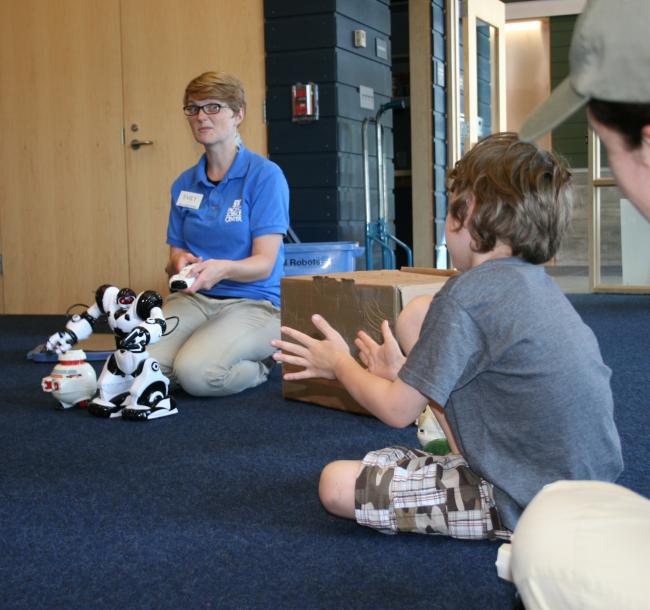Robots invade Ballard Library
Benjamin Caffee tells teacher Emily Wojcik about the kind of robot he wants July 29 at the Ballard Library. CLICK IMAGE FOR MORE PHOTOS.
Mon, 08/02/2010
By Sara Reardon
On July 30, the Ballard Library looked more like the battle deck of a sci-fi spaceship than a library. Little barrel-shaped robots blooped and bleeped and whizzed their way about on the carpet as teams of children and their parents programmed instructions. The Robot Challenge was underway.
This summer, the Pacific Science Center’s Science on Wheels program has partnered with Seattle Public Library’s Summer Reading Program to put on a number of free Robot Challenge events at different library branches.
“This is the first year we’ve focused on summer programming,” said Emily Wojcik, an instructor with Science on Wheels who directed the event.
During the school year, the Science on Wheels program drives a brightly painted van to classrooms around the state, presenting workshops and hands-on science classes on a variety of topics from rock n’ roll to the human body.
Usually they take the summer off, but a recent grant from JP Morgan Chase has allowed them to provide free science programs at community centers like libraries and Boys & Girls Clubs.
Amy Twito, youth programs manager at the Seattle Public Library, was the one who asked for robots.
“We try to have a mix of topics that attracts all audiences,” she said.
She had expected robots to interest preteen boys, yet the Robot Challenge at the New Holly branch pulled in an almost exclusively female audience.
And, as evidenced by movies from “Wall-E” to “Blade Runner,” it would be hard to name a more generation-spanning theme. The group assembled at the Ballard Library consisted of both parents and children from preschool through junior high.
“The idea is for them to work as a team to perform tasks,” said Wojcik.
She showed the group pictures of robots such as the Mars Rovers, the crew of the Hubble Space Telescope and excavating “groundhogs,” and challenged the audience to guess what characteristics allowed these real-life robots to do their jobs.
The primitive little robots at the library, however, could do little more than roll around and flash their lights.
“How would you improve your robot?” Wojcik asked the group, which suggested changes such as legs, a voice and the ability to understand commands.
The young programmers offered impressed exclamations as Wojcik pulled a state-of-the-art RoboSapien from a box. Eighteen inches tall, with glowing red eyes and a gruff voice, the new robot could walk, sense sound and karate chop.
The robots had work to do – giving high fives, picking up small objects or waving like Miss America – and the teams had to figure out how to program the directions in the right sequence.
Ballard resident Gerardo DiPietro and his daughter Mirella spoke to each other in American Sign Language to complete the tasks, giggling and mimicking the robot. Brothers Manoli and Johnny Tramountanas directed their robots with a remote control to make them dance in circles.
“I like the big one better, he’s smarter,” said grade-schooler Benjamin Caffee, who wants to program a robot to buy things for him.
He and the other participants clapped along as Wojcik programmed five RoboSapiens in a synchronized line dance.
Part of the goal of outreach programs such as Science on Wheels is to work against the stigma of science as being dry and difficult.
“There’s a push for early education in the STEM (science, technology, engineering and math) careers,” said Wojcik. “If we get kids interested at an early age, maybe they’ll remember and want to take some classes in high school or college.”
“Science education in this country is very important, and often it goes in the wrong direction,” said Twito. “That’s what’s amazing about these PSC programs; they’re so fascinating and make science so accessible.”
Funding from the Seattle Public Library Foundation has allowed the Summer Reading Program to present the classes free of cost, for which Twito is grateful.
“With science education, income is a tough thing,” she said, adding that free classes can be children’s only access to hands-on science outside of the classroom, particularly if they attend schools in low-income areas.
Sara Reardon is a News Lab student at the University of Washington.






